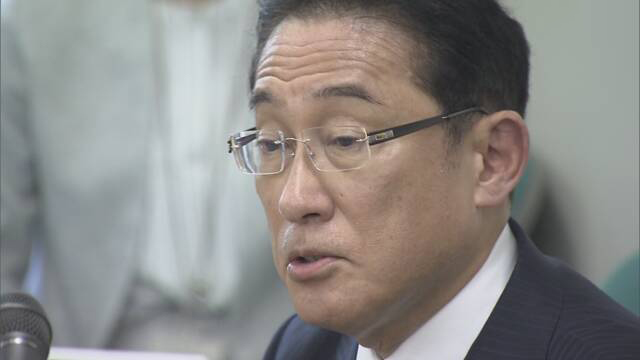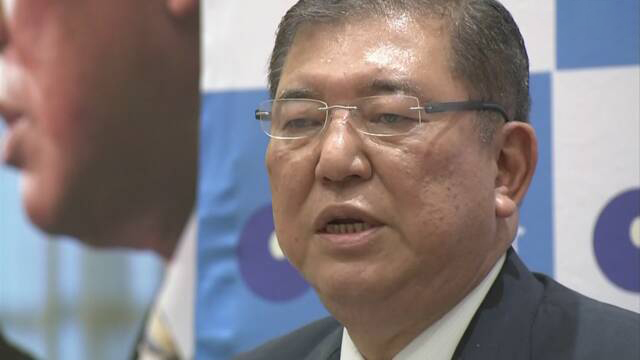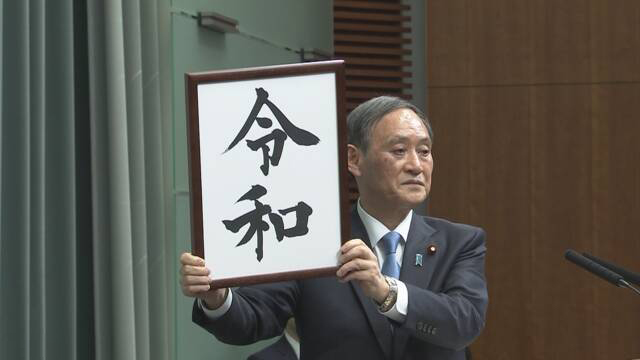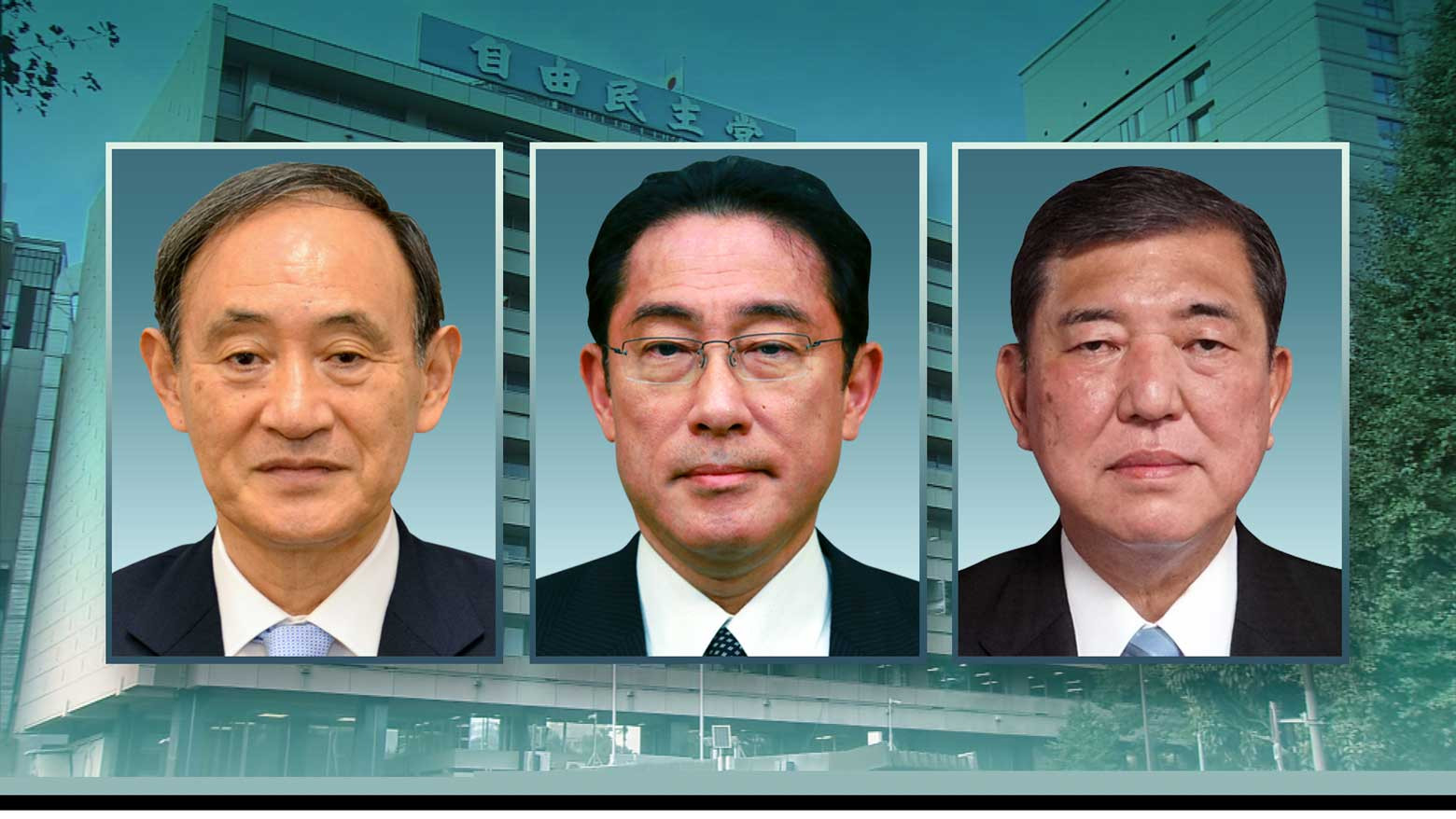Kishida Fumio
The former foreign minister was the first person to announce his candidacy in the Liberal Democratic Party (LDP) presidential election.
"I aim to become a leader who listens to the people," he said. "I want to become a leader who can unite the people."
He has long been a high profile figure within the party, but this is his first time running in the presidential election.

After briefly working at a bank, Kishida started his political career in 1993, the same year as Abe, winning a Lower House seat in Hiroshima. He has since been reelected eight times.
He was named foreign minister in the second Abe Cabinet, serving for over four years. He left the administration three years ago and was named chairman of the LDP's Policy Research Council.
Kishida has previously indicated a willingness to succeed Abe. But despite his consistent support of the administration, both as a Cabinet minister and senior party official, he has not secured an endorsement from the outgoing prime minister.
He runs the fourth biggest faction in the party.
Ishiba Shigeru
The former defense minister and party secretary-general has also tossed his hat into the ring.
"It's our responsibility to the people to give them an opportunity to listen to what each candidate has to say," he said on Tuesday, "even if the public does not have a vote in the LDP presidential election."
Like Kishida, Ishiba started off at a bank before moving into politics. He joined the Lower House in 1986, winning a seat in Tottori Prefecture, and has since been reelected ten times.

Of the three contenders, Ishiba is the only one to have once separated from the party. In 1993, he backed a no-confidence motion brought by opposition parties against the LDP Miyazawa administration for its handling of a political reform bill, and left the party. After some time with two other parties, he returned to the fold in 1997.
He has since served in a number of high ranking positions, including Defense Agency chief; agriculture, forestry and fisheries minister; and Policy Research Council chairperson. He previously ran in the 2012 LDP leadership election, just before the party retook office, and won the most votes among the five candidates. However, he lost to Abe in a runoff.
Ishiba worked with the second Abe Cabinet as the LDP secretary-general, and then served as regional revitalization minister. However, he left the Cabinet after a 2016 reshuffle, and has since been working to distance himself from Abe.
In 2018, he ran against the prime minister in the LDP leadership election. He lost despite an impressive showing in which he carried more than 40% of the vote from party members.
Ishiba leads a faction with nineteen members.
Suga Yoshihide
Abe's longtime chief cabinet secretary is, unsurprisingly, running on a platform of continuity.
"Japan is facing a crisis unlike anything we have ever experienced," Suga said on Wednesday as he announced his candidacy. "We need to do all we can to promote social and economic activities, while preventing the spread of the coronavirus. We have to protect jobs and revitalize the economy. And we must carry out reforms, with an eye on the post-coronavirus era."
After serving as a member of the Yokohama City Council, Suga first entered national politics in 1996, winning a lower house seat from Kanagawa Prefecture. He has since been reelected seven times.
He was appointed to a Cabinet position for the first time in 2006, when he was named minister of internal affairs and communications in the first Abe Cabinet.
He is also considered to have been instrumental in arranging Abe's return from the political wilderness after the prime minister resigned from his first tenure in office back in 2007. Suga urged Abe to run in the 2012 LDP presidential election, which he won, becoming the first former party leader to return to the position.

Suga rose to national prominence in April last year when he became the face of Japan's new era name. As Cabinet secretary, he announced the name, "Reiwa", on television, which gained him the nickname "Uncle Reiwa."
This is Suga's first presidential election. He does not belong to any faction.
New LDP president to be chosen on September 14
The LDP has the most seats in the Diet, so its next president will also likely be the next prime minister of Japan.
The party will elect its new leader on September 14.
Election structure
Under party rules, presidential elections are decided by 788 votes split evenly between LDP Diet representatives and party members across the country.
However, things are different in the event of an emergency, such as a resignation. In these cases, Diet members and representatives from prefectural party chapters are able to vote at a general meeting of lawmakers from both houses. A total of 535 votes are contested, including 394 from Diet members and 141 from representatives of prefectural chapters. A party member vote is not required.
This means that Diet member votes will account for more than 70% of the vote, amplifying the importance of party factions.
Ishiba is particularly popular among party members. And he was insistent that the leadership race be a regular election, in which lawmakers and party members from across the country can vote.
Some lawmakers backed this demand, calling on LDP executives to include a party member vote. They argued that the new president should be elected through open and more transparent methods.
However, the LDP has decided to hold the election under the emergency conditions, in order to ensure a swift change in power as the country deals with the coronavirus and other issues.
Factional alliances
Five of the seven LDP factions have already announced their support of Suga. Several groups of nonaligned lawmakers have also pledged their support, which means that Suga has already secured the support of more than two-thirds of party lawmakers. This would seem to make him the overwhelming favorite.
However, history shows that it's far too early to make a call. In 2001, Koizumi Junichiro was able to whittle away votes from the leading candidate and win the party presidency by amassing the support of prefectural chapters. In other words, watch this space.

